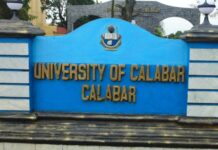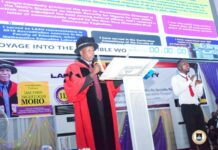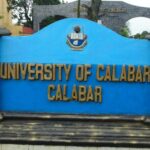The figures of Nigerian lecturers that are leaving our shores for greener pastures in foreign lands keep escalating by the day, leaving our public universities with shortage of the much-needed manpower.
Such a scary situation undermines the quality education delivery at the tertiary level, with the deleterious effects on economic development.
This has led to the call by concerned academics and other stakeholders to the federal government to reverse the drift to anomie with the desired dispatch.
According to the Chairman of the Academic Staff Union of Universities (ASUU), Usman Danfodiyo University, Sokoto, Prof. Nurudeen Almustapha,
about 100 lecturers have called it
quits with the citadel of knowledge in recent months.
But the university is not alone currently experiencing the dire implications of staff shortage.
For instance, the Federal University, Gusau, Zamfara State, is
in crying need of some hundreds of lecturers to fill the available
vacancies.
At the Federal University of Agriculture, Abeokuta, Ogun state, there are over 350 vacancies for lecturers.
In a similar vein, the University of
Lagos, UNILAG, currently needs scores of lecturers to fill the positions left by those who retired
and emigrated in recent months.
Other federal universities similarly affected include that of Ibadan, Ife and Benin.
It would be recalled that in May, 2023, the National President of ASUU, Prof. Emmanuel Osodeke, raised the alarm over the frightening issue of brain drain while addressing members at the 22nd National Delegates Conference at the University of Jos, Plateau state.
Apart from bemoaning the high number of retirement of seasoned lecturers across several universities in the country, he called on both the public and private sectors to assist in stemming the tide of brain drain.
The worsening situation, he noted, was eating at the fragile fabric of the nation’s academic development.
Amongst the reasons advanced for emigration of academics include the search for higher wages and better working conditions. They would want to work in an enabling environment devoid of muscle-flexing with the
federal government, which leads
to perennial strikes and application, in recent time, of the policy of ‘no work, no pay’.
Among the reasons for the last debilitating ASUU-FG face-off
were the demands for the ‘renegotiation’ of ASUU/FG 2009 agreement, stoppage of the Integrated Personnel Payroll Information System (IPPIS) for the payment of lecturers’ entitlements and replacement of the latter with
the University Transparency and
Accountability Solution (UTAS)
developed by ASUU.
The union also demanded for the release of the reports of the
visitation panels to federal universities, harmonization of the
distortions in salary payments,
payment of academic allowances and improved funding for public
universities.
Although the then Minister of Education, Adamu Adamu, had reportedly constituted the
white paper committee on the
visitation panels, inexplicably, he refused to inaugurate it! It
would also be recalled that eight
months after the ‘renegotiation’
of the ASUU/FG 2009 agreement
had reportedly been concluded
by the Munzali Jubril Panel, the
federal government went ahead
to constitute another committee!
The government subsequently raised the monthly pay of the academics, however, without collective bargaining.
We condemn the lackadaisical attitude of the government towards education. It is expedient
for the federal government to
always keep to the terms agreements with ASUU.
It is equally important for the lecturers to stop the practice of employing industrial action as a weapon to force government into signing unrealistic agreements and then turn round to accuse government of reneging on them, and in addition demand payment for the duration of a strike action.
There is economic downturn in Nigeria with its adverse effects on all workers in the private and public sectors.
While we acknowledge that mobility of labour, especially during hard
times, is a worldwide phenomenon and that the desire to seek greener pasture is innate in man, we call on federal and state governments to accord priority to education. The welfare of lecturers, who act as the catalyst for human capacity development, should never be under
played.
As a matter of urgency, we call on governments at all levels to improve the conditions of service and learning facilities in our ivory towers. They should also ensure that the humongous funds realised from the recent sharp increase in school fees are not mismanaged by varsity
authorities.
Editorial Opinion: Daily Independent














